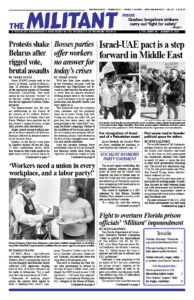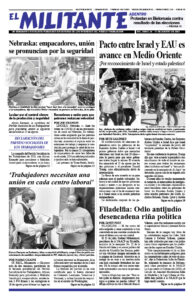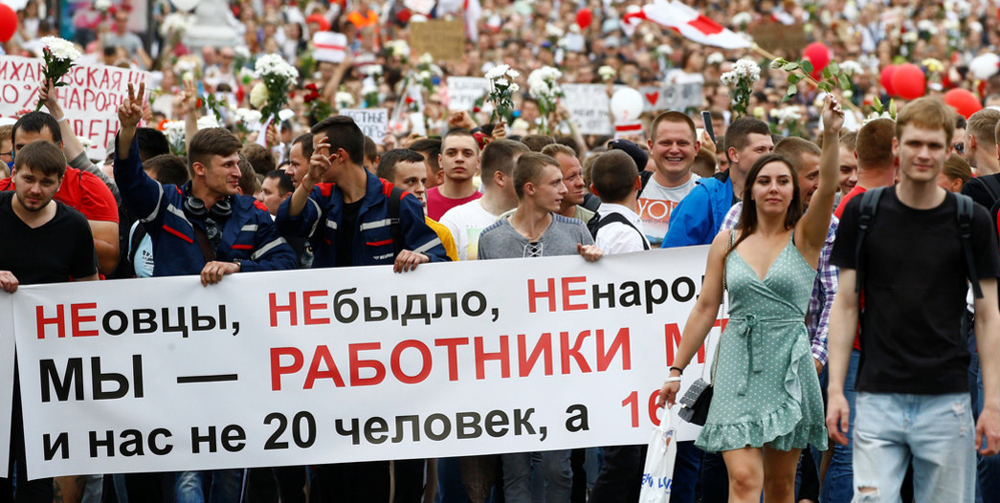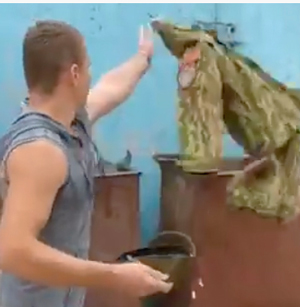Some 200,000 people took to the streets in Minsk, capital of Belarus, Aug. 16, pressing to rid themselves of the repressive regime of President Alexander Lukashenko. One week earlier he had declared “victory” in an election, widely recognized as a win for his opponent Svetlana Tikhanovskaya.
The demonstration was the largest mobilization in the history of the country of 9.5 million. Protests also took place in Grodno, Brest and Pinsk. Workers have marched out of the country’s largest factories, to join daily protests since the election.
Anger spread among working people as evidence mounted of ferocious beatings inflicted on detained protesters by security forces.
Workers at the BelAZ truck plant in Zhodino walked off the job Aug. 13 after confronting bosses when they found out that trucks made at the plant were used by security forces in their roundup of protesters. The striking workers demanded the expulsion of riot cops from the city.
When the factory manager at Minsk Tractor Works denounced workers there for their “unsanctioned” action after they refused to work, he was shouted down. Then the country’s prime minister, Roman Golovchenko, came to the plant to address workers.
“After he refused to respond to our questions in front of the media, we decided to start marching toward the main government building,” Sergei Drilevsky, a worker at the plant, told the New York Times. They demanded the release of those arrested at protests and the resignation of Lukashenko.
The president had derided protesters as “sheep,” claiming that only 20 workers at the plant joined the walkout. “We’re not sheep, we’re not a herd, we’re not little people … there are not 20 of us, but 16,000,” read a banner carried by the striking tractor workers during an Aug. 14 march in Minsk.
Protests were also held by workers at other factories, in public transit, and by oil refinery workers. As contingents of striking workers arrived at the Aug. 14 demonstration, crowds chanted out the name of the company workers came from.
“We are with the people and not one step back,” chanted striking miners in Salihorsk when they joined protests Aug. 18.
There have been anti-government protests before, in the decades since Belarus won its independence in 1991, one participant in the Aug. 16 Minsk action told the Financial Times, but nothing like this. “Today it is not just the opposition, it is the people, who simply want changes.”
Defying assaults by baton-wielding cops and the imprisonment of some 7,000 people, protesters have forced the government to release many of those detained and beaten. It apologized in a futile attempt to stem the revolt.
Signs reading, “You can’t apologize for THAT,” and demanding the arrest of Interior Minister Yuri Karayev, were left outside the offices of the state security goons.
Troops fraternize with protesters
Belarusian troops have been photographed fraternizing with protesters who offered them flowers. Some soldiers have posted videos of themselves throwing away their uniforms in disgust at the brutality.
Lukashenko tried to mobilize his own rally in the capital Aug. 16 to bolster his tottering regime, organizing free transport for those outside Minsk. But it paled beside the March for Freedom the same day, which was called by Tikhanovskaya.
Lukashenko has been the only president of Belarus since the Stalinized Soviet Union imploded.
Seeing the brutality dished out by the regime and facing threats of arrest from security forces, Tikhanovskaya fled to neighboring Lithuania after the election. Months earlier Lukashenko jailed her husband, Sergei Tikhanovsky, who was one of his two main bourgeois rivals for the presidency. She then decided to run against Lukashenko herself, with tens of thousands turning out to support her at rallies across the country.
Working people face falling real wages and growing turmoil from both the deepening worldwide crisis of capitalism and the spread of coronavirus. Some 543 people have died from the virus, but Lukashenko dismissed concern over the outbreak of the disease as “mass psychosis” and scornfully prescribed drinking vodka as a cure.
Moscow’s threats
Lukashenko’s government has historically been backed by the capitalist rulers in Russia, who see Belarus as a critical buffer against NATO troops to the west. Washington has pushed to deploy the alliance’s troops closer and closer to Russia’s borders, including rotating troops in and out of neighboring Baltic states.
Moscow quickly congratulated Lukashenko on his election “victory” and echoed his slanders against anti-government protesters, depicting them as “external forces” out to “destabilize” the country.
Russian President Vladimir Putin has been pressing Lukashenko to form a closer alliance with Moscow. To increase pressure on him to do so, Moscow halted deliveries of subsidized oil to Belarus companies earlier this year. Secretary of State Mike Pompeo then visited Minsk offering to give Lukashenko oil at “competitive prices” to replace those withheld by Moscow.
The Russian rulers station military aircraft at bases in Belarus and have been seeking to increase their forces in the country to counter Washington’s threats to expand its troop deployments in neighboring Poland.



